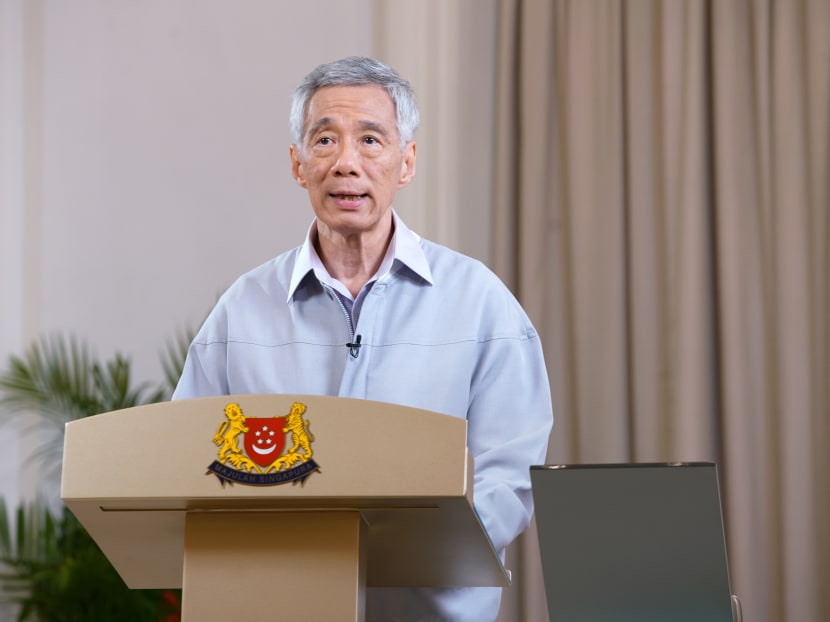Simplified health protocols and reconnecting with the world as Singapore moves to live with COVID-19: PM Lee

Prime Minister Lee Hsien Loong addresses the nation on the COVID-19 situation, on Oct 9, 2021. (Photo: Ministry of Communications and Information)
SINGAPORE: Singaporeans must update their mindsets about COVID-19 and not be paralysed by fear, said Prime Minister Lee Hsien Loong.
In outlining the steps which must be taken for the country to live with the coronavirus, Mr Lee pushed for simplified health protocols and a need to reconnect with the world.
Speaking in a live, televised address to the nation on Saturday (Oct 9), Mr Lee said COVID-19 had become a treatable, mild disease for most of the population.
This, he noted, was especially so for those who are young or fully vaccinated.
“So for 98% of us, if we catch COVID-19, we can recover by ourselves at home, just as we would if we had the flu,” he said, adding that the threat of COVID-19 was mainly to seniors as well as those who were unvaccinated.
This is why the country has shifted to relying heavily on home recovery, said Mr Lee, adding that it will be the norm for COVID-19 cases.
“You can get well in a familiar home setting, without the stress and bother of admitting yourself into a care facility. If most of us can recover at home, it will greatly ease the strain on our hospitals, doctors and nurses,” he said.
“It will free up badly needed beds for COVID-19 patients who are at high risk of becoming seriously ill, especially the elderly. Of course, if you have vulnerable family members at home, you can go to an isolation facility to recover.”
Despite this, Mr Lee acknowledged that many people still have concerns and anxieties about recovering at home, as they may be fearful of the disease, the risk to their household members as well as adequate care and support, should they get worse.
Mr Lee said he understood people’s anxieties and gave his assurance that everyone on home recovery will get the care and support they need throughout their recovery journey.
“Earlier, our service delivery fell short but we have worked hard to fix this, and put things right,” he said.
“If at any point you need to be admitted to hospital or a COVID-19 treatment facility, we will get you there.”
SIMPLIFYING HEALTH PROTOCOLS
As COVID-19 has become a manageable disease, Mr Lee said Singapore should now “drastically” simplify its health protocols.
“No more complicated flow charts,” he said. “People must be clear what to do if they test positive, or if they come into contact with someone who is infected.”
He added that everyone also needs to take personal and social responsibility, such as testing themselves if necessary, self-isolating if they test positive or consulting a doctor if they have symptoms.
“Knowing what to do, we will no longer find COVID-19 such a scary disease,” he said, as he urged the population to do their part to keep everyone safe, in particular those who are more vulnerable, such as the elderly and seniors who have not been vaccinated.
“With more COVID-19 cases, already most of us have either met someone who has gotten COVID-19, or know someone who does,” he said.
“Sooner or later, every one of us will meet the virus. This means all the elderly will meet the virus too, and for them, the risk is very real,” he added.
As of Friday noon,142 people have died from COVID-19 complications in Singapore.
Nearly all were elderly, and with pre-existing medical conditions, said Mr Lee, adding that a disproportionate number were unvaccinated seniors.
Despite barely accounting for 1.5 per cent of the population, unvaccinated seniors made up two-thirds of those who needed ICU care or died, he said.
He added that the remaining one-third were vaccinated seniors.
As cases grow, Mr Lee said so will the number of elderly cases.
“If we reach 5,000 COVID cases a day, every day we can expect around 100 to become seriously ill – not a small number,” he said.
“Our doctors and nurses do their best for every patient, unfortunately, despite their best efforts, not every seriously ill patient will make it through. Sadly, quite a few will succumb.”
“Just like with pneumonia. Every year more than 4,000 people die of pneumonia, mostly elderly and with other underlying illnesses,” he said.
“Over the next few weeks and months, we will likely see the number of COVID-related deaths continue to go up.”
RISK OF COVID-19 TO SENIORS IS “VERY REAL”
Mr Lee urged those who were unvaccinated to get their COVID-19 jabs, and vaccinated seniors to get their booster shots to strengthen their immunity.
“Vaccination has already lowered your risk substantially, but your risk is still much higher than someone younger. A booster shot will reduce your risk further,” he said.
“If you are a vaccinated senior, taking the booster reduces your risk of severe infection by more than 10 times,” he added.
Besides this, seniors should also take extra precautions to limit social interactions, he said.
“By all means go out to exercise and get fresh air but please cut back on makan, kopi and beer sessions with your friends and kakis. This will lower your exposure to the virus,” he added.
Mr Lee also addressed concerns about children under 12, who are currently not eligible for the COVID-19 shots.
He said Singapore is closely tracking the progress of vaccine trials on children in the US, adding that the country will start vaccinating children as soon as vaccines are approved for them, and its experts are satisfied that they are safe.
This, he said, will likely be early next year.
In the meantime, Mr Lee said Singapore will build up its healthcare facilities to be able to provide those who are seriously ill with the medical care they need, especially oxygen support and ICU care.
However, with a limit to how much the country can expand in terms of manpower, Singapore has to moderate the surge in COVID-19 cases, he said.
RECONNECTING WITH THE WORLD
As part of living with COVID-19, Singapore must also connect itself back to the world, said Mr Lee, adding that the country must continue to re-open its borders safely.
Singapore has started vaccinated travel lanes with Germany and Brunei, and on Friday, added South Korea to the list.
“These pilot projects have shown it is possible for vaccinated persons to travel safely, while letting in very few COVID-19 positive cases,” he said. “We are implementing more such arrangements, especially with countries whose COVID-19 situations are stable.”
This, he said, will keep Singapore connected to global supply chains and help to preserve Singapore’s hub status.
“Companies and investors need to carry out regional and global business from Singapore, people working for them need to travel to earn a living,” he said.
“Students need to go on overseas attachments and internships without having to SHN (stay-home notice) each time, families and friends will once in a while want to spend time together, overseas,” he added.
Watch the full speech:
BOOKMARK THIS: Our comprehensive coverage of the COVID-19 pandemic and its developments
Download our app or subscribe to our Telegram channel for the latest updates on the coronavirus pandemic: https://cna.asia/telegram









